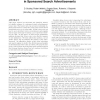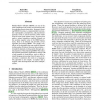499 search results - page 49 / 100 » Search Engines that Learn from Implicit Feedback |
CHI
2008
ACM
15 years 11 months ago
2008
ACM
Web image search is difficult in part because a handful of keywords are generally insufficient for characterizing the visual properties of an image. Popular engines have begun to ...
JCDL
2009
ACM
15 years 5 months ago
2009
ACM
The prevailing model for digital preservation is that archives should be similar to a “fortress”: a large, protective infrastructure built to defend a relatively small collect...
KDD
2009
ACM
15 years 11 months ago
2009
ACM
This paper explores an important and relatively unstudied quality measure of a sponsored search advertisement: bounce rate. The bounce rate of an ad can be informally defined as t...
ISMIS
2005
Springer
15 years 4 months ago
2005
Springer
Intelligent information processing systems, such as digital libraries or search engines index web-pages according to their informative content. However, web-pages contain several n...
CORR
2008
Springer
14 years 11 months ago
2008
Springer
Hidden Markov Models (HMMs) are one of the most fundamental and widely used statistical tools for modeling discrete time series. In general, learning HMMs from data is computation...


